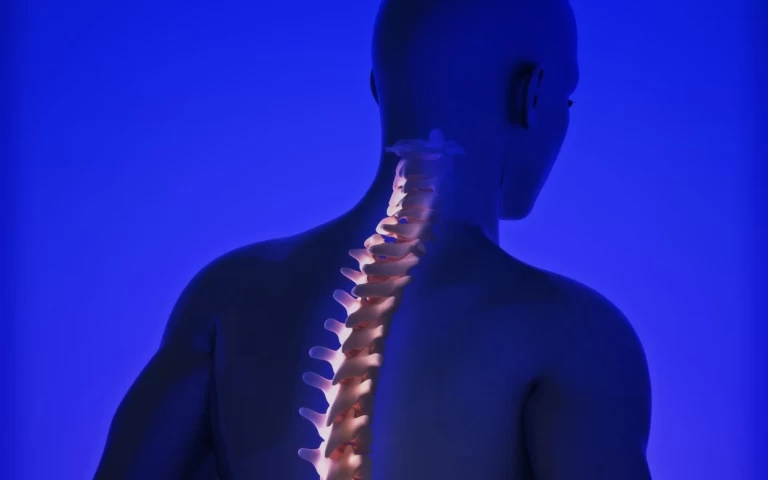
What is Burning Mouth Syndrome?
Burning mouth syndrome seems to occur without any known reason and the risk of developing burning mouth syndrome might be greater if you are a woman, if you are over the age of 50, or if you are perimenopausal or postmenopausal.
Burning mouth syndrome causes discomfort to occur that could spread throughout your mouth. It can also develop gradually over time or appear suddenly.
What Causes Burning Mouth Syndrome?
There are signs that point to the vagus nerve being involved in burning mouth syndrome. When looking in the mirror and saying “ah”, the uvula is supposed to be centered.
If your uvula is not centered and turns to the side, it is a sign your vagus nerve is not functioning normally.
A tilted uvula can be a sign of nerve degeneration, incompetency, or a decrease in nerve impulses on that side.
An accident or injury to your upper cervical spine can shift your vertebrae and change the position or press against your vagus nerve – causing this tilting to occur.
If you have a forward head posture, this may also stretch the vagus nerve or compress the nerve, blocking nerve impulses and changing the way your nerve functions, and affecting your muscles.
What are the Symptoms?
Symptoms associated with burning mouth syndrome may include:
- Loss of taste
- Tinging, stinging, or numbness in the mouth
- A sensation of dry mouth with increased thirst
- Taste changes in your mouth (bitter or metallic taste)
- A sensation of your tongue burning or scalding (may also affect your throat, lips, gums, palate, or the entire mouth
Because of the discomfort of burning mouth syndrome, you may have difficulty sleeping and eating. Burning mouth syndrome can also affect your mood and bring about anxiety and depression. To help reduce discomfort, try to avoid the following:
- Tobacco
- Spicy foods
- Acidic foods
- Carbonated beverages
- Excessive stress
While avoiding the above may help reduce discomfort, avoiding them will not be enough to stop burning mouth syndrome completely.
There is an underlying issue causing burning mouth syndrome and the best way to pinpoint what may be causing it would be to try a natural treatment that allows your body to heal and repair problems it is having more accurately.
If you are having other symptoms such as dizziness, fullness in the ear, blurry vision, migraine headaches, stiffness in the neck, or popping in the neck, check in the mirror to see if your uvula is tilted. These can be a sign that the problem lies within your upper cervical spine.
How Does Upper Cervical Help?
If you are experiencing burning mouth syndrome, upper cervical adjustments are a natural treatment that is safe to consider before moving on to more severe treatments that alter the body unnaturally, such as medication or dental surgery. It is always best to try natural options before we change how our body naturally functions.
The way medications and surgeries work is to help ignore symptoms that are causing you discomfort.
They force the body to change itself to ignore the cause of your symptoms, so even though you may have some type of relief from medication or surgery, whatever the underlying cause is can still worsen over time and cause other complications to arise.
With the upper cervical, the focus of this treatment is quite different: the upper cervical focuses on removing any interference your brain to body communication is experiencing so the body can heal and repair the injury by correcting the alignment of your upper cervical spine (your neck area).
If there is a misalignment present, this can cause pressure to be applied on your brain stem, nerves, and soft tissue within that area.
In addition, your upper cervical spine is the “leader” for the rest of your spine; this means if your upper cervical spine is out of alignment, the rest of your spine will twist and turn to follow its path – causing more issues to your body.
Changes in taste and quantity of salivation are symptoms in burning mouth syndrome and the chorda tympani branch of the facial nerve (which provides taste to the front two-thirds of your tongue), the glossopharyngeal nerve (which provides taste to the back of the tongue), and the taste receptors on the soft palate supplied by the petrosal nerve branch of the facial nerve and the laryngeal nerve of the vagus nerve can all be affected by the alignment of your top two, upper cervical vertebrae.
Your vagus nerve runs along the front of your top two vertebrae, down to the neck, and then to the digestive tract. When the vagus nerve is compressed or harmed, it could cause burning mouth syndrome to occur and irritate other nerves.
There have been reports of patients who have tried medication and surgery who had no relief from their burning mouth syndrome. However, when they tried upper cervical adjustments, they noticed signs of relief in as little as one adjustment.
This is due to pressure taken off your nerves and removing pressure placed on the brain stem to the proper brain to body communication can occur for your body to begin its repair and healing process. If you have a tilted uvula, you may also see the change in its position after upper cervical adjustments.
Upper cervical adjustments are not like general chiropractic adjustments by any means.
There is no “cracking” or “popping” involved – only small, precise motions to correct your misalignment. These are safe for any age and can provide great relief even for those who have tried other treatments beforehand because of its goal to encourage your body to function properly naturally.







Leave a comment